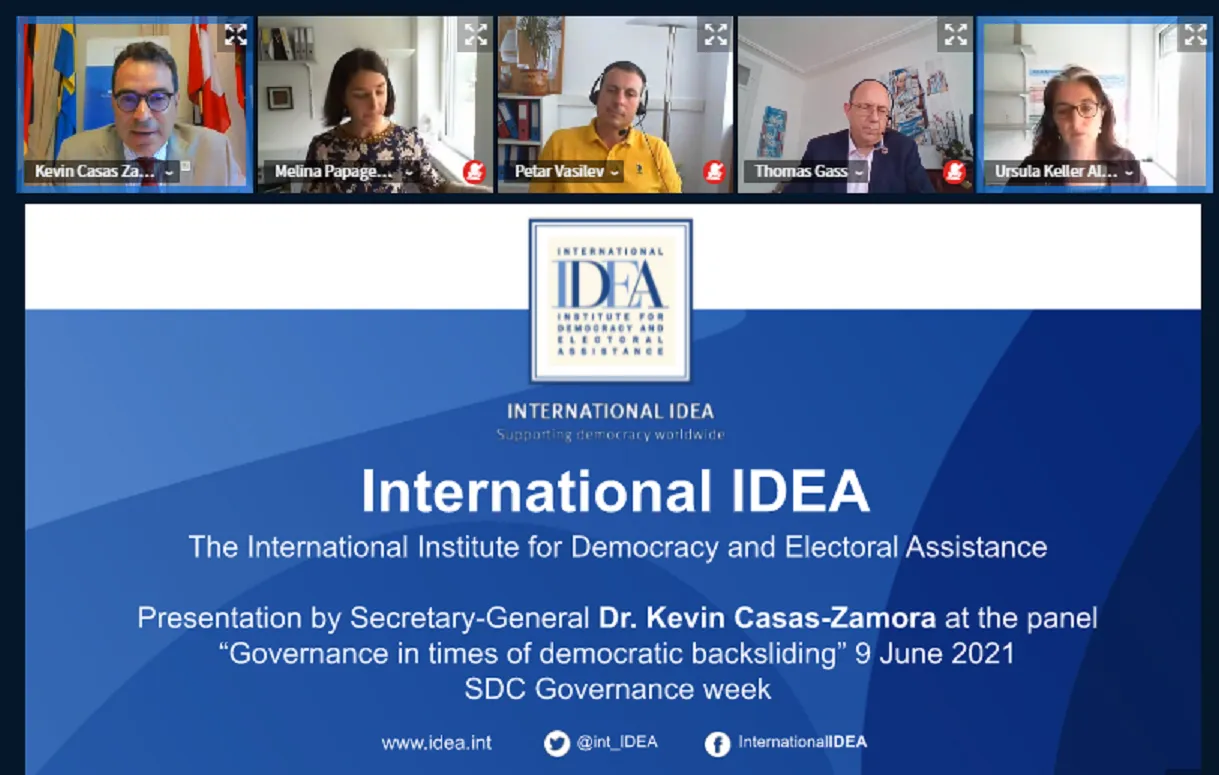High-Level Panel on Governance in Times of Democratic Backsliding

International IDEA’s Secretary-General, Dr Kevin Casas-Zamora, took part in a high-level panel on 9 June 2021 on the challenges and opportunities for governance in times of democratic backsliding. The event was organized by the Swiss Agency for Development and Cooperation (SDC) as part of its Governance Week and the broader Governance Network Journey.
The Secretary-General spoke in the panel alongside Thomas Gass, Assistant Director General and Head of the South Cooperation Department at the SDC. The event also featured regional perspectives from SDC Programme Officers Nithsa Vongphanakhone (Laos), Petar Vasilev (Serbia) as well as Governance Head Luca Etter (Tanzania) and was moderated by Ursula Keller, SDC’s Governance Focal Point.
In his remarks, the Secretary-General focused on the causes and drivers for democratic backsliding and the trend towards authoritarianism, trends and patterns regarding backsliding and the ways in which the Covid-19 crisis has affected the backsliding trend. He underlined the effect that the disappearing democratic polis, loss of faith in liberal values and the lack of compelling pro-democracy narrative have had on the backsliding trend, noting that there is a contradiction between people’s preference for democracy in theory and in practice.
The Secretary-General highlighted several trends vis-à-vis democratic backsliding, stressing that challenges with regards to backsliding are global in nature. When discussing the deteriorating quality of democracy, he referred to the findings on democratic erosion from International IDEA’s Global State of Democracy which show that there has been a sharp increase in the number of backsliding democracies since 2012. He also emphasized the worrying trend towards authoritarianism since 2016 when the number of countries becoming authoritarian outnumbered those becoming democratic.
When discussing the impact of the pandemic, the Secretary-General lifted several findings from International IDEA’s Global Monitor on Covid-19’s Impact on Democracy and Human Rights. He noted that the pandemic has accelerated democratic deterioration, pointing to evidence showing that as many as 46 democracies have implemented measures that violate democratic principles in their efforts to curb the pandemic. The Secretary-General also outlined those democratic aspects that have been the most affected by the pandemic, including personal integrity and security, freedom of expression and media integrity.
The presentation was concluded with observations on the status quo and the path ahead: While the pandemic has put democracy under severe stress, new opportunities to advance and improve democracy have also emerged. In addition, the Secretary-General alluded to the hazards for democracy that could be triggered by the political fallout from the economic crisis and emphasized the need for global, collective action to protect and restore faith in democracy. In this regard, he highlighted the role of International IDEA as a vehicle for such collective action, which will hopefully also be the result of the upcoming Summit for Democracy and the EU Action Plan on Human Rights and Democracy. Finally, he raised a few key elements in the endeavour to safeguard democracy, namely, institutional design, financial robustness as well as support to independent media and urged donors to put democracy at the heart of their foreign and development policy.




